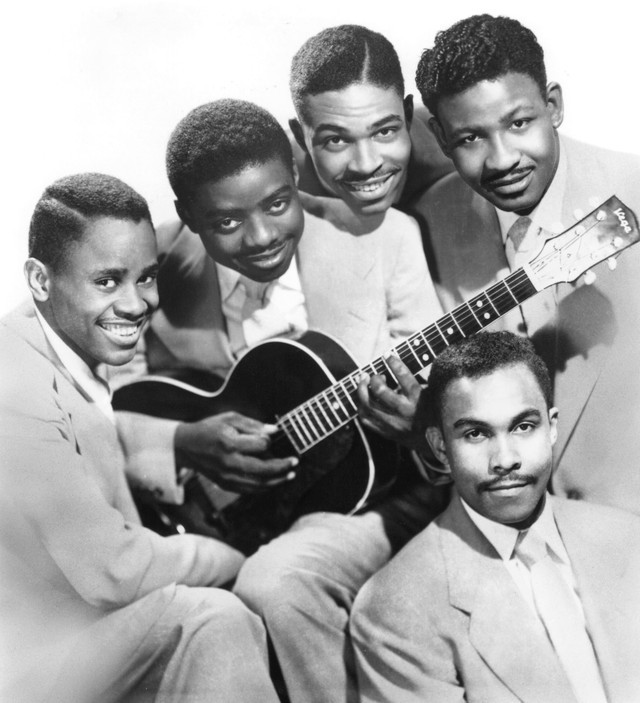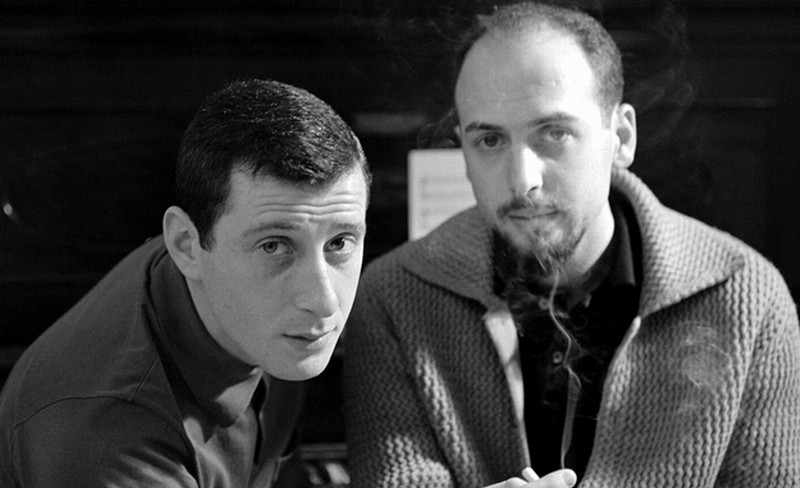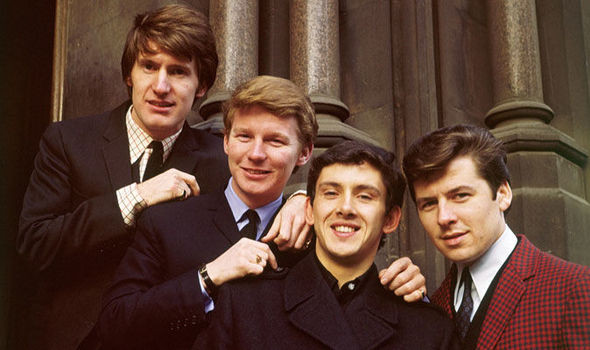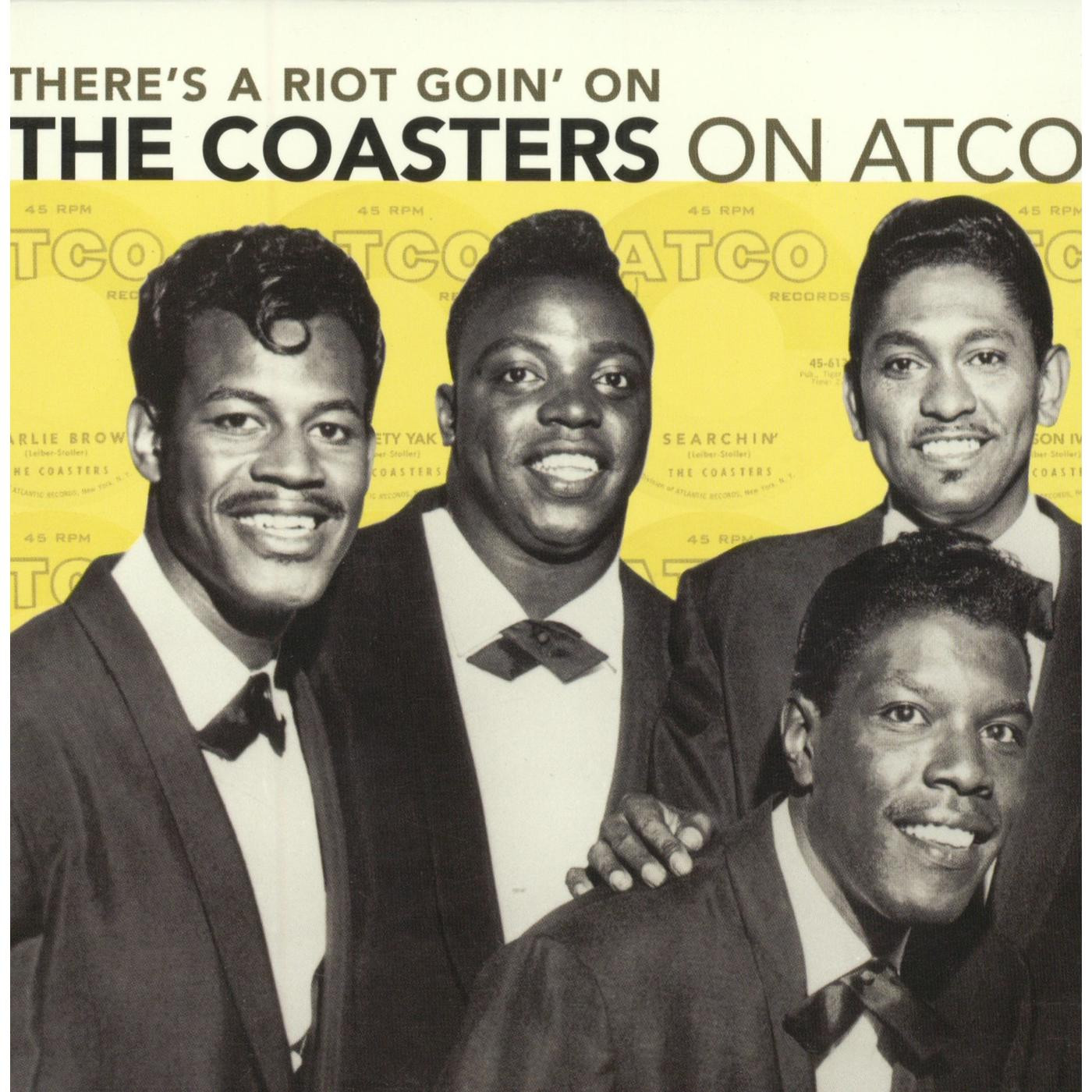“Love Potion Number 9” is a song that has enchanted listeners for decades with its quirky lyrics and catchy melody. But who exactly brought this magical brew to life? While many artists have stirred their own versions of this musical potion, the story begins with a doo-wop group from Washington D.C. Let’s delve into the history of this beloved song and discover the artists who made “Love Potion Number 9” a timeless hit.
The Clovers: The Original Brewmasters of “Love Potion No. 9”
The Clovers, a prominent vocal group of the 1950s and early 1960s, are the original creators of “Love Potion Number 9”. Formed in 1946 from high school classmates, they evolved into a quartet specializing in rhythm & blues and doo-wop. Their harmonies and smooth sound quickly gained them recognition.

The Clovers, an American doo-wop and R&B group, pictured in the 1950s, showcasing the original singers of Love Potion Number 9.
In 1951, a pivotal moment arrived when The Clovers signed with Atlantic Records. This partnership, enhanced by the addition of guitarist Bill Harris and producer Ahmet Ertegun, propelled them to R&B stardom. They dominated the charts with a string of hits, including three #1 R&B singles and eleven top 10 placements, solidifying their place in music history.
Moving to United Artists Records in 1959 marked another significant chapter. It was during their first recording session with UA that “Love Potion Number 9” was born. The song was penned by the legendary songwriting duo Jerry Leiber and Mike Stoller, masters of early rock and roll hits.

Jerry Leiber and Mike Stoller, the prolific songwriting duo who crafted Love Potion Number 9, pictured together.
Leiber and Stoller’s songwriting genius is undeniable. They were pioneers in blending R&B with emerging rock and roll sounds. Their early hits, such as “Hound Dog,” initially written for Big Mama Thornton and later popularized by Elvis Presley, and “Kansas City,” showcased their ability to create songs that transcended genres.
“Love Potion Number 9” tells a whimsical tale of a lovelorn man seeking help from Madame Rue, a gypsy fortune teller. Desperate to improve his luck with women, he’s given a mysterious potion that leads to hilarious and chaotic romantic encounters. The lyrics vividly paint a picture of his potion-induced escapades:
I took my troubles down to Madame Rue
You know that gypsy with the gold-capped tooth
She’s got a pad down on Thirty-Fourth and Vine
Sellin’ little bottles of Love Potion Number Nine
I told her that I was a flop with chicks
I’ve been this way since 1956
She looked at my palm and she made a magic sign
She said “What you need is Love Potion Number Nine”
She bent down and turned around and gave me a wink
She said “I’m gonna make it up right here in the sink”
It smelled like turpentine, it looked like India ink
I held my nose, I closed my eyes, I took a drink
I didn’t know if it was day or night
I started kissin’ everything in sight
But when I kissed a cop down on Thirty-Fourth and Vine
He broke my little bottle of Love Potion Number Nine
Listen to the original magic as The Clovers perform “Love Potion Number 9”:
This rendition by The Clovers is undeniably catchy, driven by Billy Mitchell’s lead vocals, a lively piano melody, and an energetic saxophone solo. “Love Potion Number 9” became The Clovers’ most successful song, achieving crossover success by dominating the R&B charts and reaching #23 on the Billboard Hot 100 pop chart. An alternate version even hinted at a sequel with the line, “I had so much fun that I’m going back again, I wonder what’ll happen with Love Potion Number 10?”
Despite their success, The Clovers eventually splintered in 1961 into two competing groups, yet their music and legacy, especially “Love Potion Number 9,” continued to resonate.
The Searchers: Injecting Jangly Guitars into the Potion
In the mid-1960s, amidst the British Invasion, another band put their spin on “Love Potion Number 9,” bringing a distinct jangly guitar sound to the magical concoction: The Searchers. Formed in Liverpool in 1959, initially as a skiffle group, The Searchers took their name from a John Ford western film.

The Searchers, a British rock band from the Merseybeat era, pictured in the 1960s, known for their hit cover of Love Potion Number 9.
Like The Beatles, The Searchers honed their musical skills in the clubs of Hamburg, Germany, becoming regulars at the Star Club. This experience shaped their sound and stage presence, preparing them for international success.
The Searchers released their version of “Love Potion Number 9” in the fall of 1964, and it became their biggest hit in the United States, climbing to #3 on the Billboard Pop Charts. Their interpretation injected a fresh, energetic vibe into the song, characterized by their signature “jangly guitar” sound, a hallmark of the Merseybeat sound.
Here’s The Searchers’ take on “Love Potion Number 9”:
The Searchers’ rendition cemented their status as a leading band of the British Invasion, alongside The Beatles, The Hollies, and Gerry and the Pacemakers. While personnel changes occurred within the band over the years, The Searchers continued to perform and record, becoming a staple on “oldies” tours and maintaining a dedicated fanbase until their farewell tour in 2019. Their version of “Love Potion Number 9” remains a beloved classic, showcasing their folk-rock infused pop style, often compared to a British counterpart to The Byrds.
The Coasters: A Comedic Twist on the Love Potion
Adding yet another flavor to the “Love Potion Number 9” story is The Coasters. Interestingly, The Coasters have a direct connection to the song’s writers, Leiber and Stoller. The group originated from members of The Robins, an R&B quartet who recorded for Spark Records, a label owned by Leiber and Stoller.

The Coasters original lineup in 1956, featuring the group known for their humorous take on Love Potion Number 9.
In a groundbreaking move in 1953, Atlantic Records offered Leiber and Stoller an independent production deal, allowing them to produce for Atlantic and other labels – making them the first independent record producers. When Leiber & Stoller moved The Robins to Atlantic, only two members agreed. Leiber & Stoller added two new vocalists and rebranded them as The Coasters.
While often categorized as doo-wop, The Coasters’ music was a unique blend of R&B and rock ‘n’ roll, heavily influenced by the comedic songwriting and production of Leiber and Stoller. Their songs were known for their humor and theatrical delivery, a distinct style that set them apart.
Listen to The Coasters’ unique 1971 rendition of “Love Potion Number 9”:
The Coasters’ version of “Love Potion Number 9” takes a surprising turn. Arranged in a cha-cha rhythm and featuring a funky flute solo, it’s a departure from the earlier versions, highlighting the song’s versatility and their comedic approach. Leiber and Stoller’s lyrics, particularly for The Coasters, were masterful at capturing teenage vernacular and experiences, contributing to the enduring appeal of their songs. Tracks like “Yakety Yak,” “Charlie Brown,” and “Poison Ivy” are testaments to their comedic storytelling and cultural impact.
The Coasters, inducted into the Rock and Roll Hall of Fame in 1987, were celebrated for their unique comedic contributions to rock and roll. Their songs and the musical revue “Smokey Joe’s Café,” which prominently featured Coasters hits, continue to entertain and remind us of their lasting influence.
Conclusion:
“Love Potion Number 9” is more than just a catchy tune; it’s a song with a rich history and multiple personalities. From the original doo-wop magic of The Clovers to the jangly guitars of The Searchers and the comedic cha-cha twist by The Coasters, each artist has brought their unique flavor to this enchanting song. The question of “who sang Love Potion Number 9?” reveals a fascinating journey through musical genres and generations, proving the enduring appeal of a well-crafted song and the magic it holds for each new listener.
Source Material:
Wikipedia, Love Potion No. 9 (song)
Wikipedia, The Clovers
Wikipedia, Jerry Leiber and Mike Stoller
Wikipedia, The Searchers (band)
Wikipedia, The Coasters